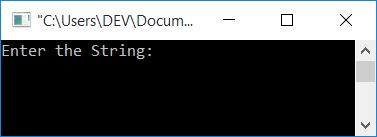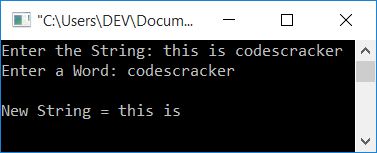- C Programming Examples
- C Programming Examples
- C Print Hello World
- C Get Input from User
- C Print Integer
- C Add Two Numbers
- C Add Subtract Multiply Divide
- C Add n Numbers
- C Area Perimeter of Square
- C Area Perimeter of Rectangle
- C Area Circum of Circle
- C Fahrenheit to Celsius
- C Celsius to Fahrenheit
- C Inches to Centimeters
- C Kilogram to Gram
- C Reverse a Number
- C Swap Two Numbers
- C Interchange Numbers
- C Print ASCII Value
- C Print Fibonacci Series
- C Check Palindrome or Not
- C Check Armstrong or Not
- C Find Armstrong Numbers
- C Find nCr and nPr
- C Find Profit Loss
- C Sum of their Square
- C First & Last Digit Sum
- C Sum of All Digit
- C Product of All Digit
- C Print Total Digit in Number
- C Check Perfect Number
- C Find Basic Gross Salary
- C Round Number to Integer
- C Print Series upto n Term
- C Find Factors of Number
- C if-else & Loop Programs
- C Check Even or Odd
- C Check Prime or Not
- C Check Alphabet or Not
- C Check Vowel or Not
- C Check Leap Year or Not
- C Is Reverse Equal Original
- C Make Calculator
- C Add Digits of Number
- Count Positive Negative Zero
- C Largest of Two Numbers
- C Largest of Three Numbers
- C Smallest of Two Numbers
- C Smallest of Three Numbers
- C Find Factorial of Number
- C Find LCM & HCF
- C Find LCM of n Numbers
- C Find HCF of n Numbers
- C Find Arithmetic Mean
- C Find Average, Percentage
- C Find Student Grade
- C Print Table of Number
- C Print Prime Numbers
- C Find Discount Purchase
- C Calculate Parcel Charge
- C Calculate Wage of Labor
- C Print Phone Bill
- C Conversion programs
- C Decimal to Binary
- C Decimal to Octal
- C Decimal to Hexadecimal
- C Binary to Decimal
- C Binary to Octal
- C Binary to Hexadecimal
- C Octal to Decimal
- C Octal to Binary
- C Octal to Hexadecimal
- C Hexadecimal to Decimal
- C Hexadecimal to Binary
- C Hexadecimal to Octal
- C Pattern Programs
- C Pattern Printing Programs
- C Print Diamond Pattern
- C Print Floyd's Triangle
- C Print Pascal's Triangle
- C Array Programs
- C 1D Array Programs
- C Linear Search
- C Binary Search
- C Largest Element in Array
- C Smallest Element in Array
- C Second Largest/Smallest
- C Count Even Odd
- C Array Element at Even
- C Array Element at Odd
- C Print Even Array Elements
- C Print Odd Array Elements
- C Sum/Product of Even/Odd
- C Reverse an Array
- C Insert Element in Array
- C Delete Element from Array
- C Merge Two Arrays
- C Bubble Sort
- C Selection Sort
- C Insertion Sort
- C Print Common Elements
- C 2D Array Programs
- C Add Two Matrices
- C Subtract Two Matrices
- C Transpose a Matrix
- C Multiply Two Matrices
- C Sum All Matrix Elements
- C Largest Element in Matrix
- C Print Row Column Total
- C 3D Array Programs
- C String Programs
- C Print String
- C Find Length of String
- C Compare Two String
- C Copy a String
- C Concatenate String
- C Reverse a String
- C Count Vowels Consonants
- C Replace Vowel in String
- C Delete Vowels from String
- C Delete Word from String
- C Frequency of Character
- C Count Word in String
- C Remove Spaces from String
- C Sort a String
- C Sort String in Alphabetical
- C Sort Words in Ascending
- C Sort Words in Descending
- C Uppercase to Lowercase
- C Lowercase to Uppercase
- C Swap Two Strings
- C Check Anagram or Not
- C Check Palindrome String
- C Print Number in Words
- C Print Successive Character
- C Character without Space
- C File Programs
- C Read a File
- C Write Content to File
- C Read & Display File
- C Copy a File
- C Merge Two Files
- C Reverse File
- C Count All Character in File
- C List Files in Directory
- C Encrypt & Decrypt a File
- C Delete a File
- C Misc Programs
- Generate Random Numbers
- C Print Date Time
- C Print Message with Time
- C Get IP Address
- C Print Smiling face
- C Pass Array to Function
- Add Two Numbers using Pointer
- C Address of Variable
- C Shutdown Computer
- C Programming Tutorial
- C Tutorial
C Program to Delete a Word from a String
In this article, you will learn and get code for deleting a word from a string. Here, the program will ask the user to enter any string and then a word to delete the given word from the given string. The program is created with and without using a two-dimensional array.
In C, delete a word from a string
To delete a particular word from the given string in C programming, you have to ask the user to enter the string and then ask for the word that has to be deleted. Then check for the presence of the given word in the string. If found, then delete it as shown in the program given below:
#include<stdio.h> #include<conio.h> #include<string.h> int main() { char str[100], word[20]; int i, j, ls, lw, temp, chk=0; printf("Enter the String: "); gets(str); printf("Enter a Word: "); gets(word); ls = strlen(str); lw = strlen(word); for(i=0; i<ls; i++) { temp = i; for(j=0; j<lw; j++) { if(str[i]==word[j]) i++; } chk = i-temp; if(chk==lw) { i = temp; for(j=i; j<(ls-lw); j++) str[j] = str[j+lw]; ls = ls-lw; str[j]='\0'; } } printf("\nNew String = %s", str); getch(); return 0; }
This program was built and runs under the Code::Blocks IDE. Here is its sample run:

Now enter any string, say "this is codescracker," followed by a word, say "codescracker." Press the ENTER key to see the following output:

In the above program, the following code fragment:
for(j=0; j<lw; j++) { if(str[i]==word[j]) i++; }
is used to check for the presence of a word (that has to be deleted) with character-by-character matching. But before the above code fragment, the value of i was initialized with temp. So that after the code fragment, we can check whether the "if" statement gets evaluated for the number of times that equals the length of the word or not. If it is, then the word is found. As a result, the following code fragment:
for(j=i; j<(ls-lw); j++)
str[j] = str[j+lw];
is used to move all the characters (after the last character's index of the word) to the place from the word where the first character's index is in the string. That is, if the word is found in the given string at index number 5. And the length of the word is 3, therefore we have to move the character at the 8th index to the 5th, the character at the 9th index to the 6th index, and so on up to the last character of the string.
Never forget to initialize the new length of the string to the ls variable. Every time the word is deleted (if it appears more than once), simply divide the length of the string by the length of the word. Now add a null-terminated character (\0) to the last index of the new string.
This program has a limitation. For example, if the string is "this is codescracker," and the user wants to delete "is," Then "is" from "this" also gets deleted. Therefore, the string becomes "th codescracker" after deleting "is." To overcome this problem, we have another program, as given below:
Complete Version of the Deleting Word from a String Program
Here is the complete version of the previous program. This program also deletes duplicate spaces from the final string.
#include<stdio.h> #include<conio.h> #include<string.h> int main() { char str[100], word[20]; int i, j, ls, lw, temp, chk=0, doIncrement, isSpace; printf("Enter the String: "); gets(str); printf("Enter a Word: "); gets(word); ls = strlen(str); lw = strlen(word); for(i=0; i<ls; i++) { temp = i; doIncrement = 0; for(j=0; j<lw; j++) { if(str[i]==word[j]) { if(temp>0 && (temp+lw)<ls) { if(str[temp-1]== ' ' && str[temp+lw]==' ') doIncrement=1; } else if(temp==0 && (temp+lw)<ls) { if(str[temp+lw]==' ') doIncrement=1; } else if(temp>0 && (temp+lw)==ls) { if(str[temp-1]== ' ') doIncrement=1; } if(doIncrement==1) i++; else break; } } chk = i-temp; if(chk==lw) { i = temp; for(j=i; j<(ls-lw); j++) str[j] = str[j+lw]; ls = ls-lw; i = temp; str[j]='\0'; } } ls = strlen(str); i=0; while(str[i]!='\0') { isSpace = 0; if(str[i]==' ' && str[i+1]==' ') { for(j=i; j<(ls-1); j++) { str[j] = str[j+1]; isSpace = 1; } } if(i==0 && str[i]==' ') { for(j=i; j<(ls-1); j++) { str[j] = str[j+1]; isSpace = 1; } } if(isSpace==0) i++; else { str[j]='\0'; ls--; } } printf("\nNew String = %s", str); getch(); return 0; }
Now let's provide the input string as "is this is is is isth codescracker" and then "is" as the word to delete. Here is its sample run:

Here the words "this" and "isth" are included to check whether the word "is" (to be deleted) gets matched from any of the sides or not. As you can see from both sides, "is" does match with both the words "this" and "isth" and also deletes all the extra spaces.
Using a Two-Dimensional Array, Remove a Word from a String
Now let's create the same-purpose program using a two-dimensional array. All of the words in the given string are placed one by one in a two-dimensional array called stringIn2DArray[]. And then I checked for the word "to be deleted." If found, just perform the task of deleting it as shown here:
#include<stdio.h> #include<conio.h> #include<string.h> int main() { char str[400], word[20], stringIn2DArray[20][20]; int i, j=0, k=0; printf("Enter the String: "); gets(str); printf("Enter the Word (to be Delete): "); gets(word); for(i=0; str[i]!='\0'; i++) { if(str[i]==' ') { stringIn2DArray[k][j]='\0'; k++; j=0; } else { stringIn2DArray[k][j]=str[i]; j++; } } stringIn2DArray[k][j] = '\0'; j=0; for(i=0; i<(k+1); i++) { if(!strcmp(stringIn2DArray[i], word)) stringIn2DArray[i][j]='\0'; } printf("\nThe New String is: "); j=0; for(i=0; i<(k+1); i++) { if(stringIn2DArray[i][j] == '\0') continue; else printf("%s ", stringIn2DArray[i]); } getch(); return 0; }
This program produces the same output as the previous one.
The same program in different languages
« Previous Program Next Program »